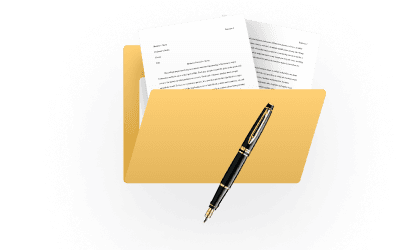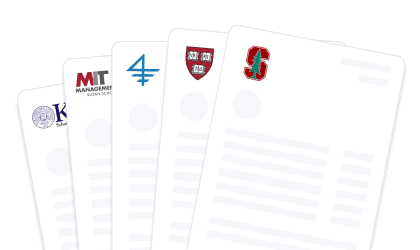
Join a free event
Learn from top coaches and industry experts in live, interactive sessions you can join for free.
Table of Contents
Applying to college can feel like a financial marathon with the costs of application fees, test prep, and consultants piling up quickly. But what if we told you that many of the most powerful tools to boost your chances of getting into top universities are completely free? In this guide, we’ve compiled 25 game-changing resources that offer expert guidance, practice materials, and insider tips, all at no cost. These resources are your secret weapon for standing out in the competitive admissions process.
Academic Resources
1. Khan Academy SAT Prep
Khan Academy partners directly with the College Board to provide personalized SAT practice. The platform adapts to your performance, focusing on weak areas while reinforcing strengths. Students who use Khan Academy for 20+ hours see an average score increase of 115 points.
The program includes:
- Full-length practice tests identical to real SAT exams
- Video explanations for every question
- Personalized practice recommendations
- Progress tracking and performance analytics
2. College Board Official Practice Tests
The College Board releases retired SAT exams as free practice tests. These represent the gold standard for test preparation since they contain actual questions from previous administrations. Download all available tests and take them under timed conditions to build stamina and familiarity.
3. ACT Academy
ACT's official online prep platform provides free practice tests, lessons, and study tools. The adaptive technology identifies knowledge gaps and creates customized study plans. Students can access hundreds of practice questions organized by subject area and difficulty level.
4. Coursera Audit Options
Major universities offer free audit access to their courses through Coursera. While you won't receive official credit, you can learn from professors at Stanford, Yale, and other top institutions. This demonstrates intellectual curiosity and can provide essay material about academic interests.
5. edX University Courses
Similar to Coursera, edX provides free access to university-level courses from Harvard, MIT, and other prestigious institutions. Complete courses in areas related to your intended major to show genuine academic engagement beyond high school requirements.
Application Platform Resources
6. Common Application Resources
The Common App website contains detailed guides for every section of the application. Their blog features advice from admissions officers, sample essays, and timeline templates. Pay special attention to their "Tips" section, which addresses common mistakes and best practices.
7. Coalition Application Guides
The Coalition for College offers extensive resources for their application platform. Their "Locker" feature allows students to store accomplishments and experiences throughout high school, making application completion more organized and thorough.
8. UC Application Resources
The University of California system provides comprehensive guides for their unique application. Their personal insight question prompts require different strategies than Common App essays, and their official resources explain exactly what admissions officers seek in responses.
Financial Aid Resources
9. FAFSA4caster
This Department of Education tool provides early estimates of federal financial aid eligibility. Input basic family financial information to receive preliminary calculations of expected aid packages. Use these estimates when creating your college list and application strategy.
10. CSS Profile Practice
College Board's CSS Profile determines eligibility for institutional aid at many private colleges. Their practice worksheets help families gather required documentation and understand complex questions before completing the actual application.
11. Net Price Calculators
Every college must provide a net price calculator on their website. These tools estimate your actual cost after financial aid based on family income, assets, and academic profile. Use calculators for every school on your list to make informed financial decisions.
12. Scholarship Search Engines
Fastweb, Scholarships.com, and College Board's scholarship search provide access to thousands of merit-based awards. Create detailed profiles to receive personalized matches, and apply early since many scholarships have rolling deadlines.
Essay and Writing Resources
13. Purdue Online Writing Lab (OWL)
Purdue's OWL provides comprehensive writing guidance, from basic grammar to advanced composition techniques. Their college essay section covers topic selection, structure, and revision strategies. The resource includes sample essays with detailed annotations explaining effective techniques.
14. University Writing Centers
Many universities publish their writing center resources online. Harvard's Writing Center, UNC's Writing Center, and Stanford's Hume Center offer guides specifically for college application essays, including topic brainstorming and revision checklists.
15. Grammarly Free Version
While the premium version offers more features, Grammarly's free tool catches basic grammar, spelling, and punctuation errors. Run all application materials through Grammarly before submission to eliminate careless mistakes that could hurt your chances.
College Research Resources
16. College Navigator
The National Center for Education Statistics operates this comprehensive database of college information. Search by location, size, majors, and other criteria to identify schools that match your preferences. The tool provides official data on graduation rates, costs, and student demographics.
17. College Scorecard
The Department of Education's College Scorecard shows employment outcomes and earning potential by major and institution. This data helps evaluate the return on investment for different schools and programs, informing your application strategy.
18. University Websites and Virtual Tours
Every college provides extensive information through their official website. Beyond basic requirements, explore departmental pages, faculty research, and student organizations. Many schools offer virtual reality tours that provide detailed campus views without visiting in person.
19. College Confidential Forums
While information quality varies, College Confidential hosts active discussions about specific schools and application processes. Read recent threads about schools on your list, but verify important information through official sources.
Application Strategy Resources
20. College Data Profiles
CollegeData.com compiles admission statistics, including GPA ranges, test scores, and acceptance rates for thousands of schools. Their "chance calculator" estimates admission probability based on your academic profile, though these should be considered rough guidelines rather than definitive predictions.
21. Niche College Rankings and Reviews
Niche provides student reviews and comprehensive rankings across multiple categories. Their data combines official statistics with student feedback on campus life, academics, and social atmosphere. Use these insights to identify schools that match your personality and goals.
22. PrepScholar Admission Requirements Database
PrepScholar compiles detailed admission requirements for hundreds of colleges, including GPA expectations, standardized test policies, and application deadlines. Their school-specific guides analyze what each institution prioritizes in applicants.
Professional Development Resources
23. LinkedIn Learning Free Courses
Many public libraries provide free access to LinkedIn Learning courses. Develop skills relevant to your intended major or career path, then reference this learning in application essays or interviews. Courses in data analysis, programming, or business skills demonstrate initiative and practical preparation.
24. Google Career Certificates
Google offers free certificate programs in high-demand fields like data analytics, UX design, and project management. While primarily career-focused, completing relevant certificates shows commitment to your academic interests and provides concrete examples of self-directed learning.
25. YouTube Educational Channels
High-quality educational content exists across every academic discipline on YouTube. Channels like Crash Course, Khan Academy, and professor lectures from top universities provide deep learning opportunities. Document significant learning experiences in application materials to show intellectual engagement.
Strategic Application Tips
Research each college's specific requirements and preferences before applying. Some schools prioritize standardized test scores, while others focus heavily on essays or extracurricular activities. Tailor your application strategy accordingly.
Create a master timeline that includes all deadlines, requirements, and milestones. Start applications during the summer before senior year to allow adequate time for revision and improvement.
Request recommendation letters at least two months before deadlines. Provide teachers and counselors with detailed information about your goals, achievements, and the schools you're applying to.
The Bottom Line
Applying to college can be costly, but many helpful resources are completely free. These 25 resources give you access to expert advice, practice tests, and useful tips to improve your chances of getting into top universities. By using these tools, you can strengthen your application without spending money on consultants. However, if you need extra help, working with a college admissions coach can make a big difference in reaching your goals.
Work With Experts to Maximize Your Applications
The college application process involves numerous moving parts and strategic decisions that can significantly impact your admission chances. While free resources provide valuable information and practice opportunities, working with experienced admissions coaches ensures you maximize every aspect of your application.
Leland's college admissions coaches have helped thousands of students gain acceptance to their dream schools. They provide personalized guidance on essay development, application strategy, and interview preparation that goes beyond what free resources can offer.
Read these next:
- How to Build the Best Extracurriculars for College
- Top 10 Colleges in the US
- 4 Tips to Elevate Your College Essay
- 5 Pro Tips for Writing Successful College Application Essays
- How to End a College Essay (With Examples)
- The 10 Best College Admissions Consultants
Frequently Asked Questions
How to start applying to college?
- To start applying to college, begin by researching schools that match your academic interests and career goals. Gather the necessary materials, such as transcripts, letters of recommendation, standardized test scores, and personal statements. Be sure to review each college’s application requirements and deadlines.
When should I start applying to college?
- It's best to start the college application process in the summer before your senior year of high school. This gives you enough time to complete applications, write essays, and gather all required documents. Most college applications are due between November and January.
What grade are college applications?
- College applications are typically completed in your senior year of high school. Many schools have deadlines in the fall (early admission) or winter (regular decision) of your senior year.
What is the #1 hardest college to get into?
- Harvard University is often considered the hardest college to get into, with an acceptance rate that is typically below 5%. The school is known for its rigorous academic standards and highly competitive applicant pool.
Browse hundreds of expert coaches
Leland coaches have helped thousands of people achieve their goals. A dedicated mentor can make all the difference.


























